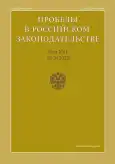Features of Legal Regulation of Economic Activities in The Status of the Self-Employed
- Authors: Snegina S.N.1
-
Affiliations:
- Financial University under the Government of the Russian Federation
- Issue: Vol 16, No 5 (2023)
- Pages: 349-357
- Section: Private Law (Civil) Sciences
- URL: https://journals.eco-vector.com/2072-3164/article/view/568886
- EDN: https://elibrary.ru/UPEQLK
- ID: 568886
Cite item
Abstract
Purpose of the study. The article examines one of the best modern practices of domestic tax administration in the field of self-employment - a tax on professional income, implemented until the end of 2028 as a legal experiment. Five years of experience in the application of a special tax regime shows that the experiment on the introduction of a new tax regime is becoming not only an important tool for economic forecasting and evaluating legislative decisions, but also makes it possible to fine-tune and improve the mechanism of legal regulation of informal sectors of the economy.
Taking into account relevant statistical data, the article assesses the effectiveness of the legal experiment on the introduction of a new tax regime, notes its success in terms of legalizing the informal employment sector in Russia, analyzes the dynamics of changes and directions for improving modern legislation on the self-employed, summarizes the experience of international cooperation between states in matters of settlement self-employment. Substantiated are modern approaches to determining the legal nature and regulation of self-employment in Russia and abroad.
Conclusions. The five-year experience of applying the new tax regime makes it possible to predict the conditions under which the goal of the legal experiment can be considered achieved, not only by counting the quantitative indicators of officially registered self-employed. The optimal situation is seen in which a self-employed individual, using the provided special tax regime, receives a sufficient amount of legal, economic and social guarantees. In the process of comparing the forms of economic activity, elements of the identity of the legal status of a self-employed citizen and an individual entrepreneur and an employee are established. By comparing a number of legal categories, it has been established that in the professional activity of a self-employed person there are features of both entrepreneurial and labor activity, and the status of a modern self-employed person in Russia is intermediate between an employee and an individual entrepreneur. In the absence of special legislative regulation, the necessity of formulating a legal definition of "self-employed" with an indication of the status features of the professional activity carried out by him is substantiated. The necessity of further improvement of the legal status of self-employed persons is argued, taking into account both public and private legal interests.
Full Text
About the authors
Svetlana N. Snegina
Financial University under the Government of the Russian Federation
Author for correspondence.
Email: ssnegina@yandex.ru
Scopus Author ID: 996446
Cand.Sci.(Law), Associate Professor, Associate Professor of the Department of Legal regulation of economic activity
Russian Federation, MoscowReferences
- Bulakh A.A. The status of the self-employed in Russian civil law // Issues of Russian Justice, 2022, No. 17, pp. 235-252.
- Deryugina T.V. Entrepreneurial or income-generating activities of non-profit organizations: problems of civil law regulation // Legal Bulletin of Samara University. 2018. №3.
- Ershova I. V., Shishmareva T. P., Enkova E. E. Legal status of the self-employed as business entities: problems and prospects for reform // Journal of the Siberian Federal University No. 14, 2021. - P. 1648-1658.
- Zherebin V.M., Romanov A.N. Self-employment of the population: Basic ideas and experience of the crisis period. M.: INFRA-M, 2019. 200 p.
- Zhukova Yu.D., Podmarkova A.S. Self-employed citizens: legal qualification of activities and prospects for the formation of a special regime // Law. Journal of the Higher School of Economics. 2021. No. 4. P. 49–79.
- Izbienova T.A., Bezina A.K. Implementation of the right to unite workers employed through Internet platforms in European countries and in the Russian Federation // Actual problems of Russian law. 2021. No. 2 (123).
- Kasatkina N.P., Shumkova N.V. From self-education to self-employment: unofficial entry of youth into the labor market // Monitoring. 2020. No. 3 (157).
- Makarov E. I., Kuzmina N. N., Grishin I. A. [et al.]. Self-employment in the Russian Federation: socio-economic, legal and legal aspects following the results of 2019–2021 // Social and labor conflicts. 2022. No. 34. P. 113–123.
- Khasenov M.Kh. Legal regulation of the self-employed population // Labor law in Russia and abroad. 2019. No. 1. P. 19–22.
- Nordenmark M., Brulin E., Vinberg S. Sickness presenteeism among the Self-employed and Employed in Northwestern Europe. – The Importance of Time Demands // Safety and Health at Work. 2019 Vol. 10. No. 2. P. 224-228.
- Wood A.J., Graham M., Lehdonvirta V. and Hjorth J. Good Gig, Bad Gig: Autonomy and Algorithmic Control in the Global Gig Economy // Work, Employment and Society. 2019 Vol. 33, no. 1, pp. 56-75.
Supplementary files











